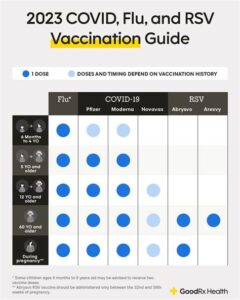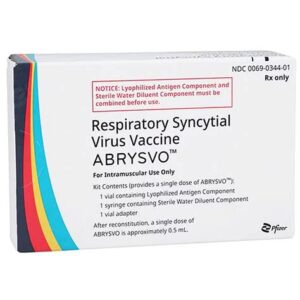Explore the essentials of RSV vaccine reimbursement, including policies, submission processes, challenges, and strategies to maximize reimbursements for healthcare providers.As the respiratory syncytial virus (RSV) continues to pose significant health risks, particularly for vulnerable populations, understanding the nuances of RSV vaccine reimbursement is crucial for both healthcare providers and patients. This blog post aims to demystify the process of RSV vaccine reimbursement, exploring essential policies and guidelines that govern it. We will delve into the steps required to submit claims effectively, while also addressing common challenges faced in the reimbursement landscape. Additionally, we’ll offer valuable insights on how healthcare providers can maximize their reimbursements for RSV vaccinations, ensuring they can continue to deliver essential care without financial strain. Join us as we navigate this important topic and empower healthcare professionals to better serve their communities.
Understanding RSV Vaccine Reimbursement
Respiratory syncytial virus (RSV) is a significant health concern, particularly for infants and the elderly. As new RSV vaccines become available, understanding the reimbursement process is crucial for healthcare providers. The reimbursement for RSV vaccines is impacted by various policies and guidelines that ensure patients have access to this preventative measure.
The reimbursement landscape for RSV vaccines can differ across various payers. It is essential for healthcare providers to be well-versed in the insurance policies governing these vaccines. Many insurance providers have started to include the RSV vaccine within their preventive care benefits, which may lead to zero copays for patients. However, this may not be the case for all plans.
To optimize the reimbursement process for RSV vaccines, healthcare providers must stay updated with the latest guidelines from government and insurance agencies. Continuous education and adaptation to changes in the reimbursement framework can lead to more effective patient care and improved financial outcomes for practices. Emphasizing the importance of detailed documentation and billing accuracy is also key to navigating this complex system.
Policies and Guidelines for RSV Vaccine Reimbursement
As the landscape of healthcare evolves, understanding the policies and guidelines governing RSV vaccine reimbursement becomes increasingly essential for both providers and patients. These policies can significantly affect how healthcare professionals manage costs and navigate insurance processes regarding respiratory syncytial virus (RSV) vaccines.
The reimbursement process for RSV vaccines can vary widely based on a patient’s insurance provider. Typically, Medicare and Medicaid have distinct guidelines. It is vital for healthcare providers to stay updated with the latest reimbursement policies to ensure that they can effectively bill for the services rendered to patients. Proper coding and documentation are critical components of this process. This includes the use of appropriate CPT codes, which specify the administration of the RSV vaccine.
Furthermore, many commercial payers are adopting similar procedures, but variations do exist. Providers should maintain an open line of communication with payers to clarify specific billing requirements and eligibility criteria for the RSV vaccine. Regular training and updates on new policies can assist healthcare institutions in maximizing reimbursements and avoiding potential claim denials.
| Step | Description |
|---|---|
| 1 | Verify patient eligibility for RSV vaccination coverage. |
| 2 | Use correct coding for the administration of the vaccine. |
| 3 | Collect necessary documentation and records for claims. |
| 4 | Submit the claim to the appropriate payer. |
| 5 | Follow up on the claim status and address any denials as needed. |
In summary, comprehending the policies and guidelines for RSV vaccine reimbursement is critical for healthcare providers to ensure financial viability and timely reimbursement. By staying informed, maintaining accurate documentation, and establishing clear communication channels with insurers, providers can navigate the complexities of vaccine reimbursement more effectively.
How to Submit RSV Vaccine Reimbursement Claims
Submitting an RSV vaccine reimbursement claim can sometimes be a challenging process, but understanding the steps can help facilitate smoother transactions. Healthcare providers must follow specific guidelines to ensure they receive proper compensation for the RSV vaccine administered.
- Gather Necessary Documentation: Ensure you have all patient information, relevant insurance details, and proof of vaccine administration (such as documentation or receipts).
- Select the Correct Codes: Utilize appropriate CPT codes for the RSV vaccine. Make sure to check the latest coding guidelines.
- Complete the Claim Form: Fill out the claim form accurately, including patient demographics, service details, and codes.
- Submit Claims on Time: Be mindful of the deadlines set by insurance providers for claim submissions to avoid denials.
- Follow Up: After submission, monitor claim status and follow up with the insurance company if necessary.
When preparing claims for the RSV vaccine, it’s crucial to stay updated with changing policies and guidelines to ensure compliance and maximize reimbursement opportunities. By adhering to these steps, healthcare providers can enhance their chances of successful reimbursement for the RSV vaccine services provided.
Ultimately, the diligence involved in submitting RSV vaccine reimbursement claims pays off, resulting in not just timely payments but also reinforcing a practice’s credibility and relationship with insurance providers.
Common Challenges in RSV Vaccine Reimbursement
Reimbursement for the Respiratory Syncytial Virus (RSV) vaccine can be fraught with challenges for healthcare providers. Understanding these challenges is crucial for ensuring that both patients and providers receive appropriate compensation for the administration of this vaccination. Below are some common challenges faced in the RSV vaccine reimbursement process.
1. Complex Coding Systems: One of the significant hurdles in RSV vaccine reimbursement is the complexity of medical coding. Providers often need to navigate various coding systems, such as ICD-10 and CPT codes, which can be confusing and may lead to errors that delay or deny reimbursement claims.
2. Payer Variability: Different insurance payers may have varying policies regarding coverage and reimbursement rates for the RSV vaccine. This variability can lead to inconsistency in payment, making it essential for healthcare providers to remain updated with each payer’s specific guidelines.
3. Insufficient Documentation: Accurate and thorough documentation is critical for successful reimbursement claims. Providers often face challenges in providing the necessary documentation that proves the medical necessity of the RSV vaccine, which can result in denied claims.
4. Lack of Awareness: Many providers may not be fully aware of the latest guidelines or changes in policies related to RSV vaccine reimbursement, leading to missed opportunities for proper compensation. Staying informed through ongoing education and training is vital.
5. Patient Eligibility Issues: Determining a patient’s eligibility for the RSV vaccine can complicate the reimbursement process. Some patients may not meet the criteria set by certain payers, resulting in potential out-of-pocket expenses that could discourage vaccine administration.
By addressing these challenges and implementing strategies to navigate the complexities of RSV vaccine reimbursement, healthcare providers can improve their chances of receiving timely and adequate compensation for their services.
Maximizing RSV Vaccine Reimbursement for Healthcare Providers
As the healthcare landscape evolves, reimbursement for critical vaccinations like Respiratory Syncytial Virus (RSV) vaccines has become essential for healthcare providers. Understanding how to maximize reimbursements can significantly impact a practice’s revenue. Here are some strategies for healthcare providers to consider.
1. Stay Informed on Policies: Frequent updates in healthcare policies can affect RSV vaccine reimbursement rates and practices. Keeping abreast of guidelines from insurance providers and Medicare or Medicaid is crucial. Attend workshops or webinars that discuss recent changes and how they impact your practice.
2. Proper Documentation: Comprehensive documentation is vital to secure proper reimbursement. Ensure that all services provided, including patient consultations, vaccine administration, and follow-ups, are well-documented. Use standardized codes for RSV vaccines and related services to minimize denials.
3. Utilize Specialized Software: Investing in specialized billing and coding software can streamline the claims process for RSV vaccine reimbursement. Choose software capable of identifying the latest codes and reimbursement rates to avoid human error and reduce claim rejections.
By implementing these strategies, healthcare providers can effectively maximize RSV vaccine reimbursement, ens
Frequently Asked Questions
What is the RSV vaccine, and why is it important?
The RSV vaccine is designed to protect against respiratory syncytial virus, a common viral infection that can lead to serious respiratory illnesses, especially in infants and older adults.
How can individuals get vaccinated against RSV?
Individuals can receive the RSV vaccine through healthcare providers, clinics, and hospitals designated to administer the vaccine.
What does vaccine reimbursement mean?
Vaccine reimbursement refers to the process through which healthcare providers are compensated for administering vaccines, including the costs of the vaccine itself and associated services.
Are vaccines covered by insurance?
Many health insurance plans cover vaccines, including the RSV vaccine, but coverage can vary by plan. It’s important to check with your specific insurance provider for details.
What factors can affect the reimbursement process for the RSV vaccine?
Factors affecting reimbursement may include the patient’s insurance plan, local healthcare policies, and whether the vaccine is administered in an approved setting.
How can patients find out if their RSV vaccination is covered?
Patients should contact their insurance provider directly or consult their healthcare provider’s office to verify coverage for RSV vaccination.
What should healthcare providers know about RSV vaccine reimbursement?
Healthcare providers should familiarize themselves with the billing codes for the RSV vaccine, ensure proper documentation, and understand the reimbursement policies of various insurance companies.





